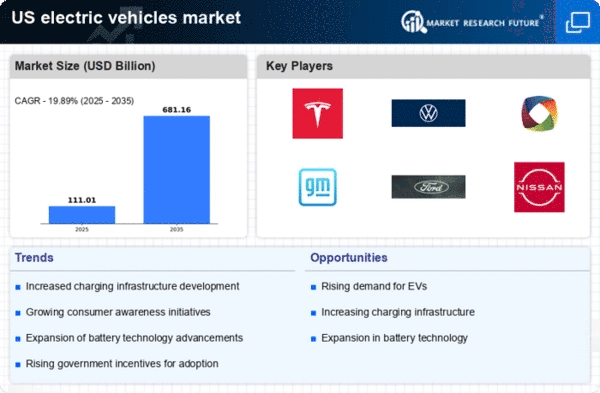Fuel Price Volatility
Fluctuations in fuel prices are significantly influencing the electric vehicles market in the US. As gasoline prices experience volatility, consumers are increasingly considering electric vehicles as a cost-effective alternative. When fuel prices rise, the total cost of ownership for traditional internal combustion engine vehicles becomes less attractive, prompting potential buyers to explore electric options. Data suggests that electric vehicles can offer substantial savings on fuel costs, with some estimates indicating savings of up to $1,000 annually compared to gasoline vehicles. This economic incentive is likely to drive more consumers towards electric vehicles, particularly during periods of high fuel prices. Consequently, the electric vehicles market may see a surge in interest and sales as consumers seek to mitigate the impact of fluctuating fuel costs on their budgets.
Rising Consumer Awareness
The electric vehicles market is experiencing a notable increase in consumer awareness regarding environmental issues and sustainability. As more individuals recognize the detrimental effects of fossil fuel consumption, there is a growing inclination towards electric vehicles. Surveys indicate that approximately 70% of consumers in the US express a preference for eco-friendly transportation options. This shift in consumer sentiment is likely to drive demand for electric vehicles, as buyers seek to reduce their carbon footprint. Furthermore, educational campaigns and marketing efforts by manufacturers are enhancing public knowledge about the benefits of electric vehicles, including lower operating costs and reduced emissions. Consequently, this heightened awareness is expected to significantly influence purchasing decisions, thereby propelling growth in the electric vehicles market. The industry's ability to effectively communicate these advantages will be crucial in capturing the interest of potential buyers.
Technological Innovations in EVs
The electric vehicles market is being propelled by rapid technological innovations that enhance vehicle performance and consumer appeal. Advances in electric drivetrains, battery efficiency, and autonomous driving capabilities are making electric vehicles more attractive to a broader audience. For example, improvements in battery technology have led to increased ranges, with many new models offering over 300 miles on a single charge. Additionally, the integration of smart technology, such as advanced infotainment systems and connectivity features, is appealing to tech-savvy consumers. As these innovations continue to evolve, they are likely to attract a diverse range of buyers, from environmentally conscious individuals to those seeking cutting-edge technology. The electric vehicles market is thus positioned for growth as manufacturers invest in research and development to meet consumer demands for enhanced performance and features.
Corporate Sustainability Initiatives
Many corporations in the US are increasingly adopting sustainability initiatives, which is positively impacting the electric vehicles market. Companies are recognizing the importance of reducing their carbon emissions and are investing in electric vehicle fleets as part of their corporate social responsibility strategies. For instance, major corporations have committed to transitioning a significant portion of their vehicle fleets to electric models, with some aiming for 100% electric by 2030. This trend not only enhances their public image but also aligns with consumer expectations for environmentally responsible practices. As businesses lead by example, the demand for electric vehicles is likely to surge, creating a ripple effect throughout the market. The electric vehicles market stands to benefit from this corporate shift, as increased fleet purchases contribute to overall sales growth and encourage further investment in electric vehicle technology.
State-Level Regulations and Mandates
State-level regulations and mandates are playing a crucial role in shaping the electric vehicles market. Various states have implemented stringent emissions standards and have set ambitious targets for electric vehicle adoption. For instance, California has established a goal for 1.5 million electric vehicles on the road by 2025, which is driving manufacturers to increase their electric vehicle offerings. These regulations not only encourage consumers to consider electric vehicles but also compel automakers to invest in electric vehicle technology and infrastructure. As states continue to adopt policies that favor electric vehicles, the market is likely to expand, with more options available for consumers. The electric vehicles market is thus positioned to benefit from these regulatory frameworks, which are designed to promote cleaner transportation solutions.
















